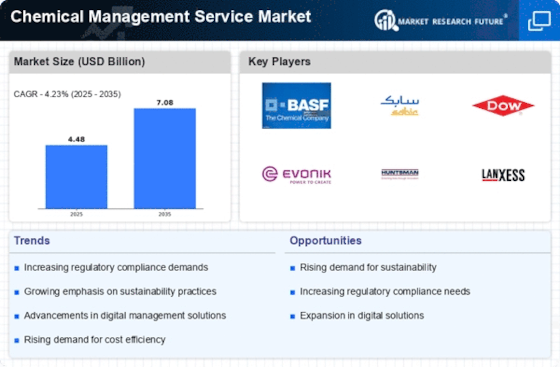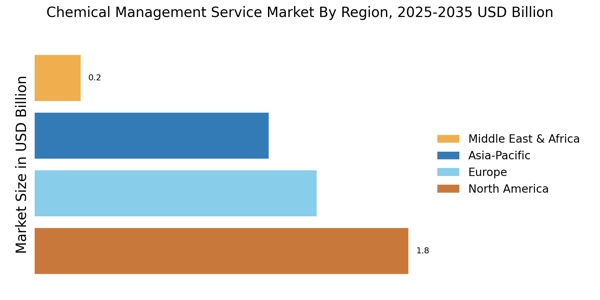Global Supply Chain Optimization
The Chemical Management Service Industry. As businesses expand their operations internationally, the complexity of managing chemical supplies increases. Effective chemical management services can streamline supply chain processes, ensuring timely delivery and compliance with various regulations across different regions. This optimization not only enhances operational efficiency but also reduces costs associated with chemical procurement and management. The market is likely to see a rise in demand for services that offer integrated supply chain solutions, with projections indicating a potential market growth of 15% over the next few years as companies seek to enhance their supply chain resilience.
Rising Demand for Chemical Safety
The increasing emphasis on chemical safety is a pivotal driver for the Chemical Management Service Market. Organizations are compelled to adhere to stringent safety regulations, which necessitate comprehensive chemical management solutions. This demand is reflected in the market, where the chemical management services sector is projected to grow at a compound annual growth rate of approximately 6.5% over the next few years. Companies are investing in services that ensure compliance with safety standards, thereby reducing the risk of accidents and enhancing workplace safety. As industries such as manufacturing and pharmaceuticals expand, the need for effective chemical management becomes even more pronounced, driving the market forward.
Integration of Advanced Technologies
The integration of advanced technologies is transforming the Chemical Management Service Market. Innovations such as artificial intelligence, machine learning, and the Internet of Things are being increasingly adopted to enhance chemical management processes. These technologies facilitate real-time monitoring and data analysis, which can lead to improved decision-making and operational efficiency. For instance, predictive analytics can help organizations anticipate chemical usage patterns, thereby optimizing inventory management. The market is witnessing a surge in demand for technology-driven solutions, with a projected increase in market size by 20% over the next five years, as companies seek to leverage these advancements for better chemical management.
Focus on Environmental Sustainability
The focus on environmental sustainability is a significant driver in the Chemical Management Service Market. As organizations strive to minimize their environmental footprint, there is a growing need for services that promote sustainable chemical practices. This trend is evident in the increasing adoption of green chemistry principles and eco-friendly chemical management solutions. Companies are now prioritizing the reduction of hazardous waste and the use of renewable resources, which is reshaping the chemical management landscape. The market is expected to expand as businesses recognize the long-term benefits of sustainable practices, potentially leading to a market growth rate of 7% annually in the coming years.
Increased Awareness of Chemical Hazards
Increased awareness of chemical hazards is driving growth in the Chemical Management Service Market. As incidents related to chemical exposure and accidents become more widely reported, organizations are recognizing the importance of effective chemical management. This heightened awareness is prompting companies to invest in comprehensive chemical management services that ensure proper handling, storage, and disposal of chemicals. The market is responding to this trend, with a projected increase in service adoption rates, particularly in sectors such as construction and agriculture, where chemical use is prevalent. This awareness is likely to contribute to a market growth rate of approximately 5% annually as businesses prioritize safety and compliance.

















